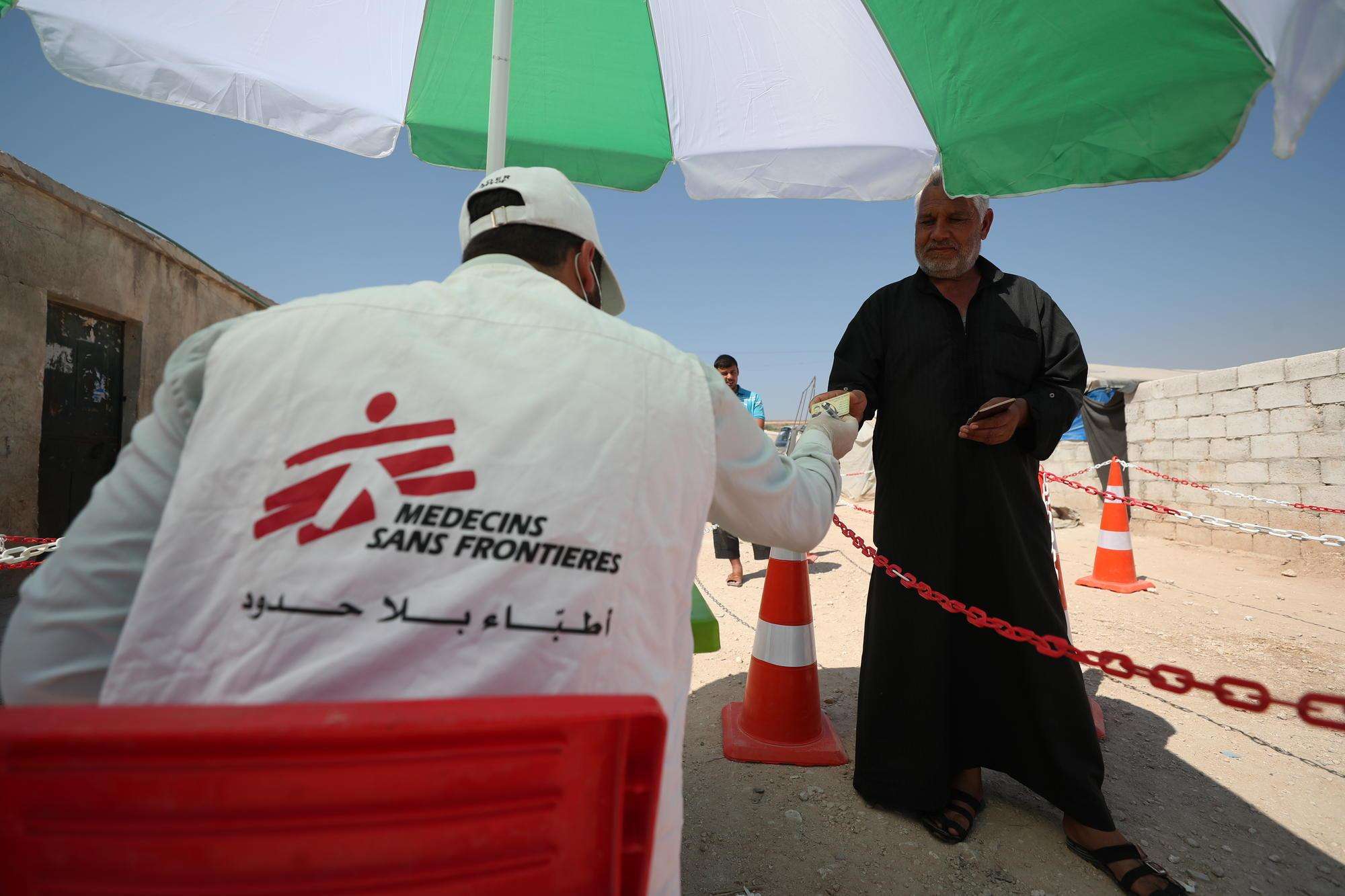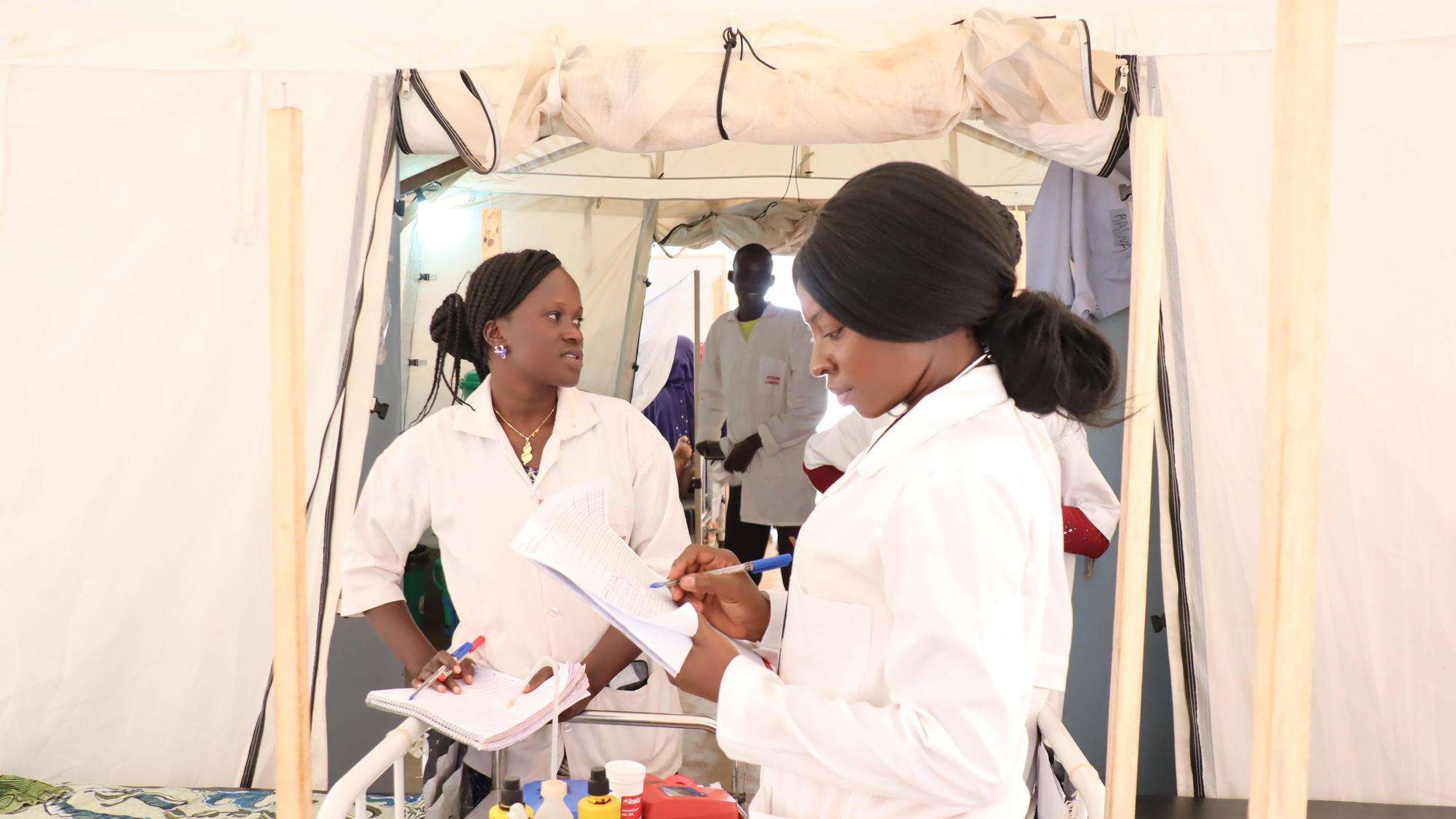Curbing the spread of COVID-19 is difficult in overcrowded camps
The number of people with COVID-19 in displacement camps in northwest Syria is ten times higher than it was just a month ago, said the international medical humanitarian organization Doctors Without Borders/Medecins Sans Frontieres (MSF) Wednesday. The organization continues to support the health system and carry out prevention activities in the camps.
As of September 22, 640 people had tested positive for COVID-19 in the region, almost 30 percent of them health workers. Eighty new cases were recorded on September 14 alone, which is the highest one-day total since the first case was recorded in early July. However, testing has remained limited, which raises doubts about the real rate of transmission and the true number of infections in the region.
“More and more COVID-19 cases are being recorded among displaced people living in camps, and this is worrying,” said Dr. Ammar, MSF’s medical activity manager in northwest Syria. “We’re trying to help people in the camps protect themselves against the virus, but we can’t change the overall situation and the fact that they live in such a place. We need to adapt constantly to provide solutions for these people who already are living in incredibly difficult conditions.”
This increase in the number of people infected with COVID-19 in the region is worsening an already-dire situation in northwest Syria. More than two million people—over half of the population—have been displaced by the conflict. Most of them now live in overcrowded camps with limited access to water and poor sanitation. Because of this, control measures like physical distancing, handwashing, and isolating are challenging—if not impossible—for most camp residents.
Since April 2020, MSF teams have distributed more than 63,000 hygiene kits, including items such as soap and detergent, to more than 26,000 displaced families in several camps across Idlib governorate and northern Aleppo governorate.
“We put different measures in place to prevent crowds from forming when people came to pick up their hygiene kits,” said Osama, a logistician supervising one of the distribution campaigns. “People are asked to maintain a safe distance between each other and to regularly wash and sanitize their hands. We ask each family to only send one person to the distribution site.”
MSF’s health educators also conduct awareness-raising sessions while people queue to receive their hygiene kits that explain how COVID-19 is transmitted and how to prevent infection. “Understanding COVID-19 and knowing more about it is a big step towards avoiding catching it,” Osama said.
Many health facilities were already struggling to meet existing medical needs in northwest Syria before the COVID-19 pandemic. Nine dedicated COVID-19 hospitals—with a combined 645 available beds—and 14 isolation and treatment centers providing basic care to patients with mild symptoms—with 550 beds—have been set-up in response to the pandemic.
“Right now, very few of the available beds in the isolation centers and hospitals are occupied, but the number of COVID-19 cases keeps on rising,” Dr. Boubaker said. “This makes the situation particularly worrying.”
MSF teams are also working in health facilities to treat patients with COVID-19 or who have other medical needs. For example, MSF has set up a triage system in each of the hospitals that they support, co-manage or run in Idlib governorate. This ensures fast detection of suspected COVID-19 cases while maintaining continuity of care for patients.
“A few days ago, a young girl came to one of the hospitals we co-manage,” said Dr. Halim Boubaker, MSF medical coordinator for northwest Syria. “She was still at the entrance when she was screened as a potential COVID-19 case. She was referred to another health facility where she tested positive for COVID-19."
One major issue is that most patients who test positive isolate at home with their families rather than in isolation centers, said Boubaker. This increases the chances of creating new clusters of infections and has contributed to the recent rise in the number of COVID-19 cases.
“Various isolation sites have been opened and patients showing COVID-19 symptoms can go there to be tested and taken care of,” Boubaker said. “More people isolating in these centers rather than in the community would definitely help in slowing down the rate of infections."
To further support the COVID-19 response in the region, MSF is managing a 30-bed treatment center for moderate and severe patients, which can refer critical patients to the Idlib national hospital. MSF also recently built an additional 31-bed isolation site in the town of Salqin that will be operational in case there’s a need to provide more isolation capacity for patients with mild to moderate symptoms in the future.
“We are trying to work on both fronts and to contribute both to the prevention of COVID-19 and treatment of patients,” Dr. Boubaker said. “We continue to do our utmost to also keep our regular services running because people still need these despite the pandemic. Northwest Syria was already an unstable region and we were used to overcoming uncertainty and complicated situations to provide assistance to people. But COVID-19 has added an extra challenge to our work.”





